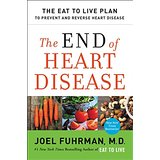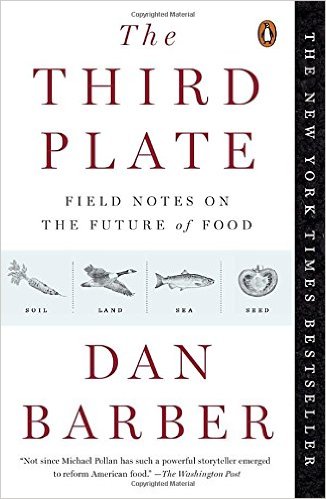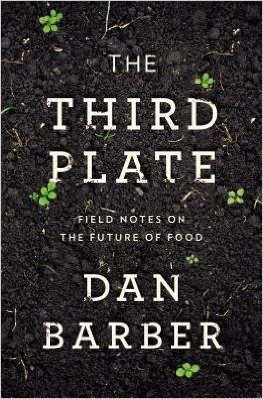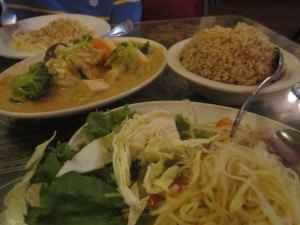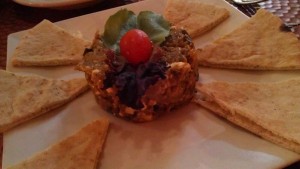Tag Archives: plant-based diet
The End of Heart Disease
by Joel Fuhrman, MD, Harper One, 2016
According to Dr. Furhman, his Nutritarian Diet will make it impossible to have a heart attack, while it reverses obstructive coronary artery disease (CAD) and radically lowers your cholesterol and blood pressure, reduces your weight, restores normal bowel function, improves your immune function and maintains youthful vigor in the face of aging. Fuhrman’s Nutritarian diet can be totally plant-based or it can be flexitarian which includes some animal products albeit in very small quantities (three small servings a week). But in either case, it is predominantly vegetables, beans seeds and nuts. The goal is a diet that is nutrient dense, hormonally favorable (avoiding, especially, excess insulin and insulin growth factor [IGF-1]), nutritionally adequate (including all essential nutrients), and avoids toxins. The basis for the diet’s choices are ANDI scores (Aggregate Nutrient Density Index) that ranks foods based on the nutrients delivered for each calorie consumed.
Plant-Based in Maui – don’t trust the web lists
Seeking out plant-based, vegan options in Maui started out as a positive and fun adventure. With only a few days notice, I searched the web and arrived with notes from Happy Cow, Vegan in Maui, and from various tweets and blog posts. “Vegan in Maui” recommended Margaritas (lots of plant-based Tex Mex options) in Kihei, a fifteen-minute drive. It sounded like a good jet-lagged choice, so we called for a reservation. The line was busy for more than an hour. So we put the address in our GPS and started off – we couldn’t find it, asked several locals – everyone looked blank. Finally someone told us it has closed, maybe, three years ago. So much for that list.
Tired and hungry, we landed at Maui Thai – a strip mall restaurant that proved more than adequate if not exactly what we had in mind. The staff was very accommodating (and knowledgeable steering us away from some of our choices – “that is made with beef broth”). We had a delicious modified Green Papaya Salad, a lovely veg curry and a heap of brown rice. Maybe best of all, it’s BYO and there’s a beer & wine shop in the same mall.
Stay tuned for some surprising finds….
VGML on American Airlines?
Tried to book a strict vegetarian (plant-based) meal on American’s long haul nonstop Dallas Fort Worth to Maui (DFW to OGG) – not available, not even in business class. The lack of accommodation was sad enough but to add insult to injury they had only loaded SIX fruit desserts when there were 36 very full “first class” seats. I managed with two small containers of humus, pretzel crisps, a salad, multiple snack packs and the raviolis emptied of their cheese. But there were lots of linens and drinks – and ice cream. The flight form LGA to DFW offered nothing edible even in first.
Zitoune Moroccan Cuisine, Mamaroneck, NY – A host of Vegan Choices plus a Belly Dancer
Along a busy stretch of Boston Post Road – 1127 W. Boston Post Rd., Mamaroneck, NY 10543 (914-835-8350) – this charming, inviting small eatery belies its surroundings. The extensive menu of classic Moroccan dishes nets a very good selection of plant-based/vegan dishes.
On the App menu, we particularly enjoyed the Vegetable Cigars – Rolled, crisp Filo surrounds marinated Vegetables (Carrot, Zucchini, Red and Green Pepper) $6, a Lentil Tagine –
Lentils cooked in a traditional Tagine Pot with Onions and Tomatoes $7.50
Three soups – Chourba $6, Lentil, $7 and Harira $7.50 are all vegan. As were three of the salads – Zitoune $6, Mediterranean $7 (with no feta) and Mediterranean Orzo $7. Always ask about cheese – they sometime leave it off the menu description.
Among the Dinner entrees we found several enticing choices –
Berber Couscous $15.50 – Traditional Moroccan Couscous as it’s enjoyed in Marrakech, served with Seven Vegetables and an Aromatic Broth
Vegetable Tagine $9 – Saffron Vegetable broth, with Carrot, Potato, Pepper and String Beans served in a traditional Moroccan Tagine
Moroccan Stewed White Beans $9.50 – with Tomato, Olive Oil, and Moroccan Seasoning, garnished with Butternut Squash
Couscous el Fassi $16.50- Fez style with Caramelized Onions, Raisins and Chick Peas
There’s also a can’t be beat Early Bird Special 5-7pm for $15.95. An appetizer, entree with a glass of wine and coffee or tea. it’s likely that one of the choices will be plant-based – but no guarantee.
Lunch is served Monday to Saturday and brunch on Sunday. The all-vegan soups are only $4, the salad choices are more extensive ($5-8) and the entrees range from a Veggie Lovers Sandwich ($6) to a Vegetable Melange ($8), the Lentil Tangine ($7.50), and the Vegetable Berber Couscous ($9).
There’s also a Prix Fixe special at lunch (11:30-1:30) $11. A soup or salad plus an entree and coffee or tea.
Why a Plant-Based (aka Vegan) Diet? The films that tell the story
Sometimes it’s hard to tell someone about eating a whole-foods, plant-based diet without sounding like you are proselytizing – a big no, no IMO. So offering a film that says it all in a non-threatening way is a gret way to go. It worked for us. A friend gave us Mike Andersen’s Eating DVD – right on the heels of having read T. Colin Campbell’s The China Study – and that changed the food habits of five or six people.
There are some superb films and DVDs that have been produced recently that make a clear case for a WFPBD. This my list of personal favorites:
Forks Over Knives (2011) created by Brian Wendel, featuring T. Colin Campbell, Caldwell Esselstyn and Neal Barnard
Got the Facts on Milk? (The Milk Documentary) (2011, 2007) by Shira Lane. Effectively questions the health benefits of milk and dairy products. Features T. Colin Campbell, Caldwell Esselstyn and Neal Barnard
Fat, Sick and Nearly Dead (2010) by Joe Cross. A personal documentary of a person with an autoimmune disease taking back his health care and trading in his pills for a juicer.
Fresh (2009) by Ana Jones. Features Joe Salatin, Will Allen, David Ball. Takes a hard look at our food production system and the negative impact of agribusiness. Takes up where Food, Inc. leaves off adding possible solutions.
Eating, 3rd Ed. (2008) a DVD on the RAVE Diet by Mike Andersen (also a book). An earlier version of this film convinced us to change from a whole-foods, sugar & meat-free diet to a total Whole Foods Plant-Based Diet (a bigger change than one might think).
Food Inc. (2008) directed by Robert Kenner. Features Michael Pollack. Champions more compassionate treatment of meat animals, but does not support a plant-based-only diet
Food Matters (2008) by James Colquhoun & Laurentine ten Bosch. Features Charlotte Gerson, Andrew Saul, Dan Rogers, David Wolfe,
Fast Food Nation (2006). Looks at the destructive impact of eating meat on health, animals and the environment
Super Size Me (2004). Morgan Spurlock’s 30-days on a McDonald’s-only diet
Foodmatters
Reference List for Plant-Based (aka Vegan) Gurus
While I don’t agree completely with any of these sources, they are, IMO, all very good and each makes a solid case for his/her slightly different perspective.
T. Colin Campbell, PhD
The China Study (2004)
Caldwell B. Esselstyn, Jr., MD
Prevent and Reverse Heart Disease: The Revolutionary, Scientifically Proven, Nutrition-Based Cure (2008)
Joel Fuhrman, MD
Eat to Live: The Amazing Nutrient-Rich Program for Fast and Sustained Weight Loss, Revised Edition (2011)
Annemarie Colbin, PhD
The Whole-Food Guide to Strong Bones: A Holistic Approach (2009)
Neal Barnard, MD
Dr. Neal Barnard’s Program for Reversing Diabetes: The Scientifically Proven System for Reversing Diabetes without Drugs (2008)
Andrew Weill, MD
Spontaneous Happiness (2011)
Mark Hyman, MD
The Blood Sugar Solution: The UltraHealthy Program for Losing Weight, Preventing Disease, and Feeling Great Now! (2012)
John McDougall, MD
The Starch Solution: Eat the Foods You Love, Regain Your Health, and Lose the Weight for Good! (2012)
Dean Ornish, MD
The Spectrum: A Scientifically Proven Program to Feel Better, Live Longer, Lose Weight, and Gain Health (2008)
Joan Dye Gussow, PhD
Growing, Older – A Chronicle of Death, Life and Vegetables (2010)
For how we got into this mess and what we need to do to get out of it:
David Kessler’s The End of Overeating
Doug Lisle’s The Pleasure Principle
Stewart Brand’s The Whole Earth Discipline
And for the best overall, easy to understand take on WFPBD, I love Julieanna Hever’s Complete Idiots Guide to Plant-Based Nutrition
Reverse Type 2 Diabetes with a Plant-Based Diet?
One in 10 Americans suffer from Diabetes Meillitus Type Two — one in four over the age of 60. 285 billion people world-wide represent a 10-fold increase in 25 years, and one in two will have the disease or a precursor by 2020. Today the annual cost to the US Health care system alone is almost $180 billion – and it will continue to grow to $3.5 trillion in just a decade.
Billions of dollars are spent on hundreds of drugs designed to manage the disease – Alpha-glucosidase inhibitors,Biguanides, Meglitinides, Sulfonylureas, Thiazolidinediones plus injectibles like exenatide, mitiglinide, pramlintide, sitagliptin, saxagliptin….
But still serious complications persist – glaucoma, cataracts, kidney disease, heart attacks, hypertension, hearing loss, gum disease, gastroparesis, ketoacidosis, depression, neuropathy, peripheral arterial disease, stress, stroke, damaged nerves, skin disorders, Hyperosmolar Hyperglycemic Nonketotic Syndrome……
WHAT IF THERE WAS A CURE? A magic bullet that could make all of this go away? Change lives, save billions of dollars, and deep six one of the world’s most prevalent, damaging diseases.
There is! According to a ground-breaking study published in Diabetologia, Type 2 Diabetes can be reversed in one to eight weeks! The secret? A low glycemic load, high-fiber, whole-foods, plant-based diet!
REFERENCES:
Reversal of type 2 diabetes: normalization of beta cell function in association with decrease pancreas and liver triglycerides Diabetologia; DOI 10.1007/s00125-011-2204-7 E. L. Lim & K. G. Hollingsworth & B. S. Aribisala & M. J. Chen & J. C. Mathers & R. Taylor
Cow’s Milk given to infants may create Type 1 Diabetes
Ten statistically significant studies demonstrate a noteworthy increase in Juvenile Onset (Type 1) Diabetes in children who were not breast fed and, instead, were given cows’ milk during the first two years of life.
According to T. Colin Campbell, Ph.D. “A very specific sequence of 17 amino acids found in cows’ milk generated production of a specific antibody and that antibody … discovered exactly the same 17 amino acid sequence on the cells of the pancreas that was producing the insulin.” Once it attacked those cells, that child’s pancreas could no longer produce insulin – ever.
It is also now known, for example, that certain children have a much greater genetic susceptibility to the cow’s milk amino acid sequence with the additional presumption that, perhaps, these children were also exposed to a particular kind of virus as well. So, according to Dr. Campbell, Type 1 Diabetes could result from an unhappy combination of genetically susceptible children being exposed to cows’ milk and perhaps also to a certain kind of virus.”
Remarkably, the association between Type 1 Diabetes and cows’ milk coupled with high-risk genes, is even greater than the relationship between smoking and lung cancer. A 12-country study demonstrated that the higher the consumption of cows milk, the higher the incidence of type 1 Diabetes. Since 1992, The Academy of Pediatrics has warned against giving cows’ milk to children younger than one for a variety of reasons so one must wonder why this information is not more widely publicized.
According to Sayer Ji, on WakeUp-World.com, “in genetically susceptible individuals the consumption of cow’s milk may trigger an autoimmune destruction of the beta cells in the pancreas which produce insulin. A new study published in the journal Archives of Pediatric and Adolescent Medicine, has shed light on a possible new mechanism behind this connection.
“Finnish researchers looked at 1113 infants with a genetic susceptibility to type 1 diabetes and who were randomly assigned to receive one of three infant formulas during the first 6 months of life whenever breast milk was not available:
- Cow’s milk formula (CMF)
- Whey-based hydrolyzed formula (WHF)
- Whey-based formula free of bovine insulin (insulin-free CMF)
“Beta cell autoimmunity was monitored at ages 3,6, and 12 months and then annually until 3 years of age. The results were reported as follows: Since 1992, The Academy of Pediatrics has warned against giving cows’ milk to children younger than one for a variety of reasons so one must wonder why this information is not more widely publicized.
“In comparison with ordinary CMF, weaning to an insulin-free CMF reduced the cumulative incidence of autoantibodies by age 3 years in children at genetic risk of type 1 diabetes mellitus. The likelihood of finding autoantibodies associated with beta cell autoimmunity was 25% lower in the whey-based hydrolyzed formula group, and 61% lower in the insulin-free whey-based formula when compared with the cow’s milk formula group”.
REFERENCES:
“Insulin-free whey-based cow’s milk formula is associated with lower incidence of beta cell autoimmunity in infants and young children.” Arch Pediatr Adolesc Med. 2012 Mar 5. Epub 2012 Mar 5. PMID: 22393174
Committee on Nutrition. “The Use of Whole Cow’s Milk in Infancy” Pediatrics Vol. 89 No. 6 June 1, 1992; pp. 1105 -1109
Hammond-McKibben D, and Dosch H-M. “Cow’s milk, bovine serum albumin, and IDDM: can we settle the controversies?” Diabetes Care 20 (1997): 897-901
Karjalainen J, Martin JM, Knip M, et al. “A bovine albumin peptide as a possible trigger of insulin-dependent Diabetes Mellitus.” New Engl. Journ. Med 327 (1992): 302-307
.
“Insulin-free whey-based cow’s milk formula is associated with lower incidence of beta cell autoimmunity in infants and young children.” Arch Pediatr Adolesc Med. 2012 Mar 5. Epub 2012 Mar 5. PMID: 22393174
Committee on Nutrition. “The Use of Whole Cow’s Milk in Infancy” Pediatrics Vol. 89 No. 6 June 1, 1992; pp. 1105 -1109
Hammond-McKibben D, and Dosch H-M. “Cow’s milk, bovine serum albumin, and IDDM: can we settle the controversies?” Diabetes Care 20 (1997): 897-901
Karjalainen J, Martin JM, Knip M, et al. “A bovine albumin peptide as a possible trigger of insulin-dependent Diabetes Mellitus.” New Engl. Journ. Med 327 (1992): 302-307
.
Dr. John McDougall Challenges Paula Dean
Whole-food, plant-based Diet Guru John McDougall has challenged cook book author and TV personality Paula Dean to a bet. He has invited Ms. Dean, who recently admitted that she has Type 2 Diabetes, to spend ten days at his center learning how to eat healthfully.
Dr. McDougall’s bet: “Would we love a trim-looking Paula Deen on a cooking show? How would we react if she lost weight and cured her diabetes right in front of our eyes? I am willing to make a giant effort to help Paula help herself and America become trimmer and healthier. I am publically inviting her to my 10-day, live-in clinic in Santa Rosa, CA. As an added incentive, I am offering her a Mitt Romney size bet* that my Program will change her personal health and her style of cooking on her future TV shows. Furthermore, if she attends my program and does not make the significant positive changes that I predict, then I will be a guest on her cooking show and eat sliced beef wrapped in bacon strips and fried in chicken fat. Otherwise, if the McDougall Program does, as I confidently predict, cause her to lose weight, lower her blood sugar, and get her off her diabetic drugs, then she will agree to be a speaker at my next Advanced Study Weekend, September 7-9, 2012, and prepare a five-course, low-fat vegan meal with a starch centerpiece, ending with a healthy dessert.”
http://www.drmcdougall.com/misc/2012nl/jan/deen.htm
Sadly, it appears that she is using this platform to promote the diabetes drug, Victoza.
